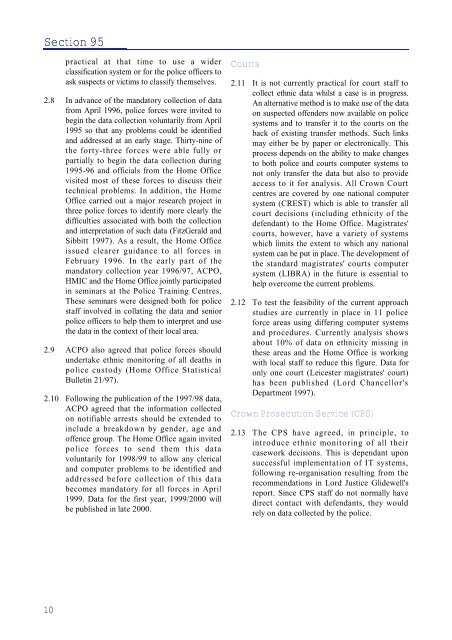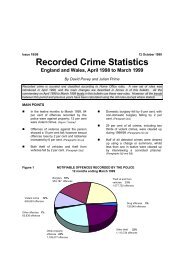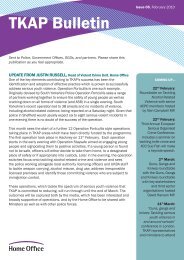Statistics on Race and the Criminal Justice System 1998
Statistics on Race and the Criminal Justice System 1998
Statistics on Race and the Criminal Justice System 1998
Create successful ePaper yourself
Turn your PDF publications into a flip-book with our unique Google optimized e-Paper software.
Secti<strong>on</strong> 95<br />
practical at that time to use a wider<br />
classificati<strong>on</strong> system or for <strong>the</strong> police officers to<br />
ask suspects or victims to classify <strong>the</strong>mselves.<br />
2.8 In advance of <strong>the</strong> m<strong>and</strong>atory collecti<strong>on</strong> of data<br />
from April 1996, police forces were invited to<br />
begin <strong>the</strong> data collecti<strong>on</strong> voluntarily from April<br />
1995 so that any problems could be identified<br />
<strong>and</strong> addressed at an early stage. Thirty-nine of<br />
<strong>the</strong> forty-three forces were able fully or<br />
partially to begin <strong>the</strong> data collecti<strong>on</strong> during<br />
1995-96 <strong>and</strong> officials from <strong>the</strong> Home Office<br />
visited most of <strong>the</strong>se forces to discuss <strong>the</strong>ir<br />
technical problems. In additi<strong>on</strong>, <strong>the</strong> Home<br />
Office carried out a major research project in<br />
three police forces to identify more clearly <strong>the</strong><br />
difficulties associated with both <strong>the</strong> collecti<strong>on</strong><br />
<strong>and</strong> interpretati<strong>on</strong> of such data (FitzGerald <strong>and</strong><br />
Sibbitt 1997). As a result, <strong>the</strong> Home Office<br />
issued clearer guidance to all forces in<br />
February 1996. In <strong>the</strong> early part of <strong>the</strong><br />
m<strong>and</strong>atory collecti<strong>on</strong> year 1996/97, ACPO,<br />
HMIC <strong>and</strong> <strong>the</strong> Home Office jointly participated<br />
in seminars at <strong>the</strong> Police Training Centres.<br />
These seminars were designed both for police<br />
staff involved in collating <strong>the</strong> data <strong>and</strong> senior<br />
police officers to help <strong>the</strong>m to interpret <strong>and</strong> use<br />
<strong>the</strong> data in <strong>the</strong> c<strong>on</strong>text of <strong>the</strong>ir local area.<br />
2.9 ACPO also agreed that police forces should<br />
undertake ethnic m<strong>on</strong>itoring of all deaths in<br />
police custody (Home Office Statistical<br />
Bulletin 21/97).<br />
2.10 Following <strong>the</strong> publicati<strong>on</strong> of <strong>the</strong> 1997/98 data,<br />
ACPO agreed that <strong>the</strong> informati<strong>on</strong> collected<br />
<strong>on</strong> notifiable arrests should be extended to<br />
include a breakdown by gender, age <strong>and</strong><br />
offence group. The Home Office again invited<br />
police forces to send <strong>the</strong>m this data<br />
voluntarily for <strong>1998</strong>/99 to allow any clerical<br />
<strong>and</strong> computer problems to be identified <strong>and</strong><br />
addressed before collecti<strong>on</strong> of this data<br />
becomes m<strong>and</strong>atory for all forces in April<br />
1999. Data for <strong>the</strong> first year, 1999/2000 will<br />
be published in late 2000.<br />
10<br />
Courts<br />
2.11 It is not currently practical for court staff to<br />
collect ethnic data whilst a case is in progress.<br />
An alternative method is to make use of <strong>the</strong> data<br />
<strong>on</strong> suspected offenders now available <strong>on</strong> police<br />
systems <strong>and</strong> to transfer it to <strong>the</strong> courts <strong>on</strong> <strong>the</strong><br />
back of existing transfer methods. Such links<br />
may ei<strong>the</strong>r be by paper or electr<strong>on</strong>ically. This<br />
process depends <strong>on</strong> <strong>the</strong> ability to make changes<br />
to both police <strong>and</strong> courts computer systems to<br />
not <strong>on</strong>ly transfer <strong>the</strong> data but also to provide<br />
access to it for analysis. All Crown Court<br />
centres are covered by <strong>on</strong>e nati<strong>on</strong>al computer<br />
system (CREST) which is able to transfer all<br />
court decisi<strong>on</strong>s (including ethnicity of <strong>the</strong><br />
defendant) to <strong>the</strong> Home Office. Magistrates'<br />
courts, however, have a variety of systems<br />
which limits <strong>the</strong> extent to which any nati<strong>on</strong>al<br />
system can be put in place. The development of<br />
<strong>the</strong> st<strong>and</strong>ard magistrates' courts computer<br />
system (LIBRA) in <strong>the</strong> future is essential to<br />
help overcome <strong>the</strong> current problems.<br />
2.12 To test <strong>the</strong> feasibility of <strong>the</strong> current approach<br />
studies are currently in place in 11 police<br />
force areas using differing computer systems<br />
<strong>and</strong> procedures. Currently analysis shows<br />
about 10% of data <strong>on</strong> ethnicity missing in<br />
<strong>the</strong>se areas <strong>and</strong> <strong>the</strong> Home Office is working<br />
with local staff to reduce this figure. Data for<br />
<strong>on</strong>ly <strong>on</strong>e court (Leicester magistrates' court)<br />
has been published (Lord Chancellor's<br />
Department 1997).<br />
Crown Prosecuti<strong>on</strong> Service (CPS)<br />
2.13 The CPS have agreed, in principle, to<br />
introduce ethnic m<strong>on</strong>itoring of all <strong>the</strong>ir<br />
casework decisi<strong>on</strong>s. This is dependant up<strong>on</strong><br />
successful implementati<strong>on</strong> of IT systems,<br />
following re-organisati<strong>on</strong> resulting from <strong>the</strong><br />
recommendati<strong>on</strong>s in Lord <strong>Justice</strong> Glidewell's<br />
report. Since CPS staff do not normally have<br />
direct c<strong>on</strong>tact with defendants, <strong>the</strong>y would<br />
rely <strong>on</strong> data collected by <strong>the</strong> police.

















